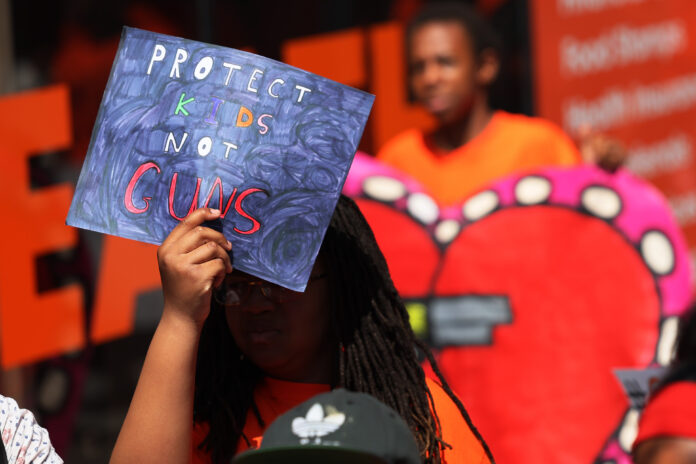Imagine being in church for the funeral of a gun violence victim and hearing shots going off outside. That was my experience late last year and it summed up how overwhelmed this country is by gun violence, building mountains of despair with tragedy after tragedy.
This past December, I attended the celebration of life service for Di’Mesha Wright, when it was interrupted by gunfire. Twenty-three-year-old Di’Mesha was killed by a shooter using an AR-style rifle to shoot through the front door of a home. Di’Mesha was holding her 7-month-old baby when she was shot. As we gathered to remember her and pray for her family, we heard shots ring out. People ran from the aisles and sought cover. And an already painful day was made even worse.
Truly, we no longer have time to properly mourn before another shooting takes place. During that service in my home church, I felt so demoralized. It was and is devastating. But we owe it to the victims and their families, as well as our country, not to be desensitized and defeated.
As President Joe Biden said during his State of the Union address, the families torn apart by gun violence have a clear message for us all. Over and over again, from Newtown to Parkland to Uvalde, they pled with elected officials to act. When I meet with constituents in Northeast Ohio, I hear the same thing. People are tired of feeling unsafe in places of worship, at the movie theater, or when they drop their kids off at school.
The former president of the United States, now the presumptive Republican Party nominee, responded to a mass shooting at an Iowa school by saying we just have to “get over it.” Well, I refuse to do so. It is time for Congress to pass universal background checks and ban assault weapons and high-capacity magazines. It is time to close the loopholes that make a mockery of some of the few checks that we have. We also need to get the most dangerous and destructive weapons off the street. Assault weapons have become the weapon of choice for mass shooters, due to their ease of use and lethality.
From 1994-2004, we enjoyed a limited assault weapons ban in this country, and it made a difference. According to one analysis, the likelihood of mass shootings decreased by 70 percent during that period, while the share of assault weapons in guns recovered by police declined. Was it perfect? No. But it helped reduce the number of assault weapons in circulation—and that made us all safer.
We also have to counteract the widespread feeling of despair that exists among many elected officials and the public. Too many, on both sides of the aisle, seem to believe that nothing can be done. Some have reached this conclusion from completely different ideological positions but believe it just the same.
Michael M. Santiago/Getty Images
But progress is possible. In 2022, the 117th Congress passed the Bipartisan Safer Communities Act, and I proudly voted for it. This was the first major gun safety bill signed into law in two decades. It enhanced background checks for buyers under 21, provided funding for state red flag laws, expanded gun safety laws relating to domestic abusers, funded community violence intervention programs, and invested in mental health services and access.
The Bipartisan Safer Communities Act also established federal laws against interstate firearm trafficking and straw purchases, or buying a firearm for someone legally prohibited from possessing one. These new efforts to combat firearm trafficking and untraceable guns are a very big deal—and they are provisions law enforcement and gun safety groups highlight as important fixes to a longstanding problem.
I have also filed legislation, The Shining a Spotlight on Safer Communities Act (H.R. 7272), that requires reporting the impact of these new laws. The legislation is cosponsored by 31 colleagues and supported by Giffords, Everytown, and Brady: United Against Gun Violence. It requires the gathering of hard data on how many weapons and gun traffickers we are getting off the street. Why? If we can demonstrate progress, we can gain more support, and build the broad coalition needed to enact further legislation.
The pain of gun violence is felt in every community in this country, including mine. Our constituents sent us to Congress to solve problems, not ignore them. It’s time to listen to the people and take action.
Congresswoman Shontel M. Brown represents Ohio’s 11th District in the United States House of Representatives.
The views expressed in this article are the writer’s own.
Uncommon Knowledge
Newsweek is committed to challenging conventional wisdom and finding connections in the search for common ground.
Newsweek is committed to challenging conventional wisdom and finding connections in the search for common ground.


